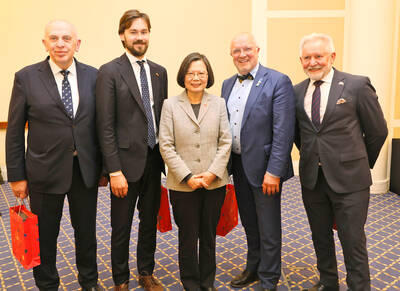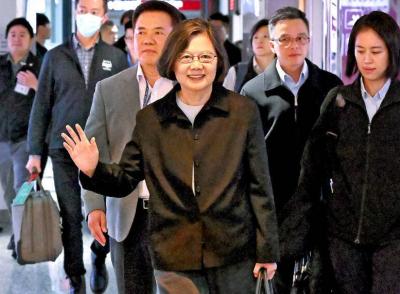The expulsion of two legislators by the Taiwan Solidarity Union (TSU) has put the party in a difficult position regarding the January elections, but Democratic Progressive Party (DPP) presidential candidate Frank Hsieh (
The TSU raised political eyebrows on Monday when it dismissed legislators Liao Pen-yen (廖本煙) and Huang Chung-yung (黃宗源).
TSU Chairman Huang Kun-huei (
TSU Legislator Lin Jih-jia (林志嘉), director of the party's caucus office and one of the initiators of the motion to expel the duo, blamed the pair's close relationship with the DPP's disbanded New Tide faction for their dismissal.
He said that Liao and Huang were too close to Vice Premier Chiou I-jen (
Lin said his party did not want to pick a fight with the DPP but that they were prepared to confront the New Tide.
Lin said the New Tide, which has long been in favor of developing closer economic ties with China and favored former premier Su Tseng-chang (
Liao and Huang may not be the only two legislators the TSU will cull. Speculation is mounting that the party will dismiss legislators Yin Ling-ying (
Yin said on Saturday that she would join the DPP if it would help the pan-green camp win the legislative election.
David Huang said that he was confused by his party's dismissal of Liao and Huang Chung-yung and that he should be expelled too if being too close to DPP members was the reason for their expulsion.
Political analyst Wang Kung-yi (王崑義) said yesterday that the TSU's move was the result of political maneuvering aimed at helping Hsieh cut ties with President Chen Shui-bian (陳水扁) and the New Tide, who have taken Hsieh hostage.
"A split between Hsieh and Chen after the legislative elections is inevitable," Wang said.
"Hsieh does not want to allow Chen to continue to dominate his campaign strategy in the run-up to the presidential election in March, not to mention his national policy if elected," Wang said.
Since the election campaign kicked off a few months ago, Chen has outshone Hsieh and dominated newspaper headlines on a daily basis, largely thanks to his criticism of Chinese Nationalist Party (KMT) presidential candidate Ma Ying-jeou (馬英九).
It is not the perfect time for Hsieh to break up with Chen and the New Tide, Wang said, but Hsieh is ready to strike because he must prove to his supporters that he is the presidential candidate, not Chen.
If Hsieh wins the presidential election, Wang said the KMT is bound to split into two forces: the pro-localization and pro-mainlander.
The pro-localization faction is likely to defect and join forces with former president Lee Teng-hui (
If Hsieh were to lose, he and the New Tide will go their separate ways and Hsieh is likely to leave the DPP and join Lee's new political force whose moderate political position is identified by Hsieh, Wang said.
Although it is still too early to tell whether the TSU's strategy will actually work, Wang said that the party must make an all-out effort to remain as a viable political force if it does not want to follow in the footsteps of the People First Party, which is being gradually absorbed by the KMT.
Chao Yung-mau (
"It is a dramatic and dangerous move," he said.
Besides, the party does not benefit from it in the short term because the candidates they nominate to replace the legislators they expelled are unlikely to win, he said.
Chao speculated that Lee, who is known for his political acuteness, may try something else before the elections to boost the TSU's odds of winning more seats in the legislative polling, in which a new electoral system will be used.
Political commentator Luis Chong (
They will either disappear or merge with bigger parties if they fail to come up with more distinctive or appealing policies, he said.
Chong also criticized the TSU's new path of "center left" as "vague" and "unsuited" for Taiwan.
However, a "vague" party line may serve as an advantage for the party in a new political situation following the legislative and presidential elections, he said.

Former president Tsai Ing-wen (蔡英文) on Monday called for greater cooperation between Taiwan, Lithuania and the EU to counter threats to information security, including attacks on undersea cables and other critical infrastructure. In a speech at Vilnius University in the Lithuanian capital, Tsai highlighted recent incidents in which vital undersea cables — essential for cross-border data transmission — were severed in the Taiwan Strait and the Baltic Sea over the past year. Taiwanese authorities suspect Chinese sabotage in the incidents near Taiwan’s waters, while EU leaders have said Russia is the likely culprit behind similar breaches in the Baltic. “Taiwan and our European

The Taipei District Court sentenced babysitters Liu Tsai-hsuan (劉彩萱) and Liu Jou-lin (劉若琳) to life and 18 years in prison respectively today for causing the death of a one-year-old boy in December 2023. The Taipei District Prosecutors’ Office said that Liu Tsai-hsuan was entrusted with the care of a one-year-old boy, nicknamed Kai Kai (剴剴), in August 2023 by the Child Welfare League Foundation. From Sept. 1 to Dec. 23 that year, she and her sister Liu Jou-lin allegedly committed acts of abuse against the boy, who was rushed to the hospital with severe injuries on Dec. 24, 2023, but did not

LIKE-MINDED COUNTRIES: Despite the threats from outside, Taiwan and Lithuania thrived and developed their economies, former president Tsai Ing-wen said Former president Tsai Ing-wen (蔡英文) on Saturday thanked Lithuania for its support of Taiwan, saying that both countries are united as partners in defending democracy. Speaking at a reception organized by the Lithuania-Taiwan Parliamentary Friendship Group welcoming her on her first visit to the Baltic state, Tsai said that while she was president from 2016 to last year, many Lithuanian “friends” visited Taiwan. “And I told myself I have to be here. I am very happy that I am here, a wonderful country and wonderful people,” Tsai said. Taiwan and Lithuania are in similar situations as both are neighbors to authoritarian countries, she

Former president Tsai Ing-wen (蔡英文) is to visit the UK during her ongoing European trip, which originally included only Lithuania and Denmark, her office said today. Tsai departed Taiwan for Europe on Friday night, with planned stops in Lithuania and Denmark, marking her second visit to the continent since her two-term presidency ended in May last year. Her office issued a statement today saying that Tsai would also visit the UK "for a few days," during which she is to meet with UK politicians and Taiwanese professionals, and visit academic and research institutions. Following Tsai's stop in Denmark, she is to visit the